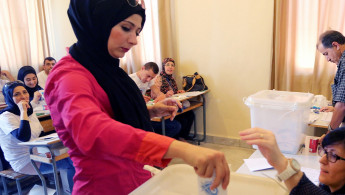North Lebanon local elections dethrone traditional Sunni leaders
The results could have far-reaching implications for leadership of the Sunni community in a country where political power is divided according to sectarian quotas.
On Monday, unofficial results showed a semi-independent list backed by Tripoli politician and former justice minister Ashraf Rifi taking 18 of 24 local council seats. A list backed by former prime ministers Saad Hariri and Najib Mikati, both billionnaires, won only six seats.
Local newspaper The Daily Star called it "the biggest upset in Lebanon's local elections this month".
Rifi was previously part of Hariri's Future Movement, but has since distanced himself from the once-powerful Sunni leader over what he perceives as Hariri's appeasement of Hizballah.
Rifi, also former head of the country's Internal Security Forces, resigned as justice minister after the falling out.
 |
Rifi's victory in the local elections poses a serious challenge to Sunni leaders in the country |  |
Biggest upset
In quotes carried by the Daily Star, Rifi said his ticket's victory was an indication that the people of Tripoli rejected Hariri's path, in reference to his recent nomination of Hizballah ally and Marada Movement leader Suleiman Franjieh for the presidency.
|
"Definitely, Tripoli said 'No' to the election of Franjieh for president a long time ago," Rifi said in a conversation with Radio Free Lebanon.
Rifi said Tripoli had entered "a new era", and called on Hariri to go back to the principles of his father, the late Prime Minister Rafik Hariri.
"I don't mind directly and indirectly meeting with the Future Movement and cooperating with them on any decision which is in line with ours. The door is open," Rifi said in another conversation with Voice of Lebanon radio.
Rifi told the radio station that he would not reverse his decision to resign until a new president is elected.
Prior to the elections, the former minister accused his opponents in the city helping Hizballah gain influence in Tripoli.
Sunni leadership challenge
Rifi's victory in the local elections poses a serious challenge to Sunni leaders in the country, who need the support of Lebanon's Sunni bastion of Tripoli to claim legitimate representation of the community.
"Ashraf Rifi can now say he has the popular legitimacy," political analyst Thaer Ghandour wrote in The New Arab's sister Arabic-language edition. "All the MPs of the city together lost the fight to Rifi," despite him lacking the support of the Lebanese media and security services, he added.
Unlike his opponents, Rifi has successfully connected to the poor and working class in the city, proving that "political money" is not the the number one factor in winning over support, wrote Ghandour on Monday.
|
Rifi is popular in the city not only because of his tough line on Hizballah, seen by many in the Sunni community as their primary foe, but also because he has stood by local Islamist militants, many of whom are now detained over their role in previous clashes with pro-Syrian regime militants in the city.
According to analysts, the municipal election results will be seen as a rehearsal for the general election in 2017. And Rifi's ascendency could pose a serious challenge to the dominant players in the Sunni community, led by Saad Hariri and Najib Mikati.
Hariri conceded the election on Monday, calling on political factions to put aise differences and welcome the new municipal council.
Mikati also congratulated the winning list.





 Follow the Middle East's top stories in English at The New Arab on Google News
Follow the Middle East's top stories in English at The New Arab on Google News
![22 Arab countries at COP29 have rejected the targeting of fossil fuels [Getty]](/sites/default/files/styles/image_330x185/public/2024-11/GettyImages-2184289638.jpg?h=199d8c1f&itok=ptHl5bec)
![Dozens of people turned out for the funerals [Getty]](/sites/default/files/styles/image_330x185/public/2024-11/GettyImages-2185229760.jpg?h=e7c891e8&itok=1bctDcE6)
![The UAE is widely suspected of arming the RSF militia [Getty]](/sites/default/files/styles/image_330x185/public/2024-11/GettyImages-472529908.jpg?h=69f2b9d0&itok=Yauw3YTG)